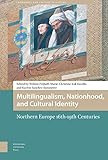Multilingualism, Nationhood, and Cultural Identity : Northern Europe, 16th-19th Centuries / ed. by Karène Sanchez-Summerer, Marie-Christine Kok Escalle, Willem Frijhoff.
Material type: TextSeries: Languages and culture in history ; 1Publisher: Amsterdam : Amsterdam University Press, [2016]Copyright date: 2016Description: 1 online resource (188 p.) : 4 halftonesContent type:
TextSeries: Languages and culture in history ; 1Publisher: Amsterdam : Amsterdam University Press, [2016]Copyright date: 2016Description: 1 online resource (188 p.) : 4 halftonesContent type: - 9789048530007
- Language and culture -- Europe -- History
- Languages in contact -- Europe -- History
- Multilingualism -- Europe -- History
- AUP Wetenschappelijk
- Amsterdam University Press
- Language and Literature
- Linguistics
- LANGUAGE ARTS & DISCIPLINES / Linguistics / Historical & Comparative
- Multilingualism Francophonie Language teaching Early Modern period Autodidactics History of language contacts
- 306.44/6094
- P115.5.E85 M8745 2017
- online - DeGruyter
| Item type | Current library | Call number | URL | Status | Notes | Barcode | |
|---|---|---|---|---|---|---|---|
 eBook
eBook
|
Biblioteca "Angelicum" Pont. Univ. S.Tommaso d'Aquino Nuvola online | online - DeGruyter (Browse shelf(Opens below)) | Online access | Not for loan (Accesso limitato) | Accesso per gli utenti autorizzati / Access for authorized users | (dgr)9789048530007 |
Browsing Biblioteca "Angelicum" Pont. Univ. S.Tommaso d'Aquino shelves, Shelving location: Nuvola online Close shelf browser (Hides shelf browser)
Frontmatter -- Table of Contents -- Languages and Culture in History. A New Series -- Part I. Approaches to Multilingualism in the Past -- 1. Codes, Routines and Communication. Forms and Meaning of Linguistic Plurality in Western European Societies in Former Times -- 2. Capitalizing Multilingual Competence. Language Learning and Teaching in the Early Modern Period -- Part II. Multilingualism in Early Modern Times: Three Examples -- 3. Plurilingualism in Augsburg and Nuremberg in Early Modern Times -- 4. Multilingualism in the Dutch Golden Age. An Exploration -- 5. Literacy, Usage and National Prestige. The Changing Fortunes of Gaelic in Ireland -- Index
restricted access online access with authorization star
http://purl.org/coar/access_right/c_16ec
Before the modern nation-state became a stable, widespread phenomenon throughout northern Europe, multilingualism-the use of multiple languages in one geographical area-was common throughout the region. This book brings together historians and linguists, who apply their respective analytic tools to offer an interdisciplinary interpretation of the functions of multilingualism in identity-building in the period, and, from that, draw valuable lessons for understanding today's cosmopolitan societies.
Mode of access: Internet via World Wide Web.
In English.
Description based on online resource; title from PDF title page (publisher's Web site, viewed 26. Aug 2024)









